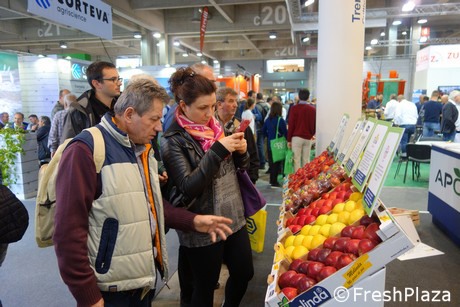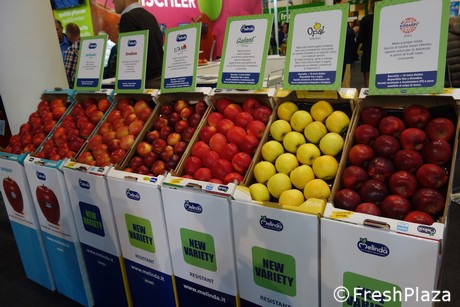
"I'm discovering the world of apples and the entire universe of fresh produce more and more and I am fascinated by it, I think they have an incredible strength," reports Paolo Gerevini, Melinda general director, in an interview to FreshPlaza at Interpoma 2018.
He was appointed director a couple of years ago and previously worked for leading processing companies such as Barilla, Conserve Italia and Pizzoli. A comparison between the two sectors is therefore unavoidable.
Gerevini stresses the strengths of the fresh produce segment: "great skill, extensive experience and professionalism, an international dimension and a unique speed of action in the entire food and agricultural sector."
What is there to improve, then?
"Maybe we should look more at consumers, i.e. the last yet most important link of the entire chain, because they eat the produce and can determine its success."
"We need an overall picture, we mustn't just look at the main markets, but also at the small ones, as they could have a leading role in the future."
He cited the Pink Lady and Zespri cases as virtuous examples: "we need to combine the strengths of the fresh produce sector with those of the industry. If it's true that the main markets are slowing down, we need to react. As Campbell Soup general director David Johnson said, 'there are no mature markets, but only tired marketing managers'. I'm convinced we need to focus the attention on final consumers. There are needs that still haven't been met."
Presenting the supply well is also important. "I feel not enough attention is paid to how products are presented and marketing mixes."
When it comes to varietal innovation, Melinda showcased the most recent varieties on which it will invest until 2025 at the APOT/Melinda/La Trentina collective stand at Interpoma.
 There was a lot of interest for the varieties to be commercialised by Melinda. They should become fully productive by 2025.
There was a lot of interest for the varieties to be commercialised by Melinda. They should become fully productive by 2025.

"We are focusing on varietal diversification not so much to find an alternative to traditional Golden apples, but rather to make our range more balanced and combine various producer and consumer needs with an eye to profitability."
"The global scenario is increasingly divided between the attention to prices and the orientation towards value. The products that aim at falling into the second category mustn't only be good to eat, they must also have a story to tell. Melinda apples are grown in a territory with costs that are difficult to cut, so our products must be surrounded by values that make it impossible to produce Melinda apples anywhere else."
As regards Interpoma, Gerevini observes that "this is the second time I've taken part. I didn't fully grasp its importance in 2016, but I did this year. It is well organised and has an international dimension with visitors from the US, New Zealand, South America and Eastern European countries. It therefore combines the best technical skills and a global vision. The only thing I regret is not being able to take part in all conventions, but we did manage to establish important agreements such as the one with Feno for Fengapi-Tessa apples."
